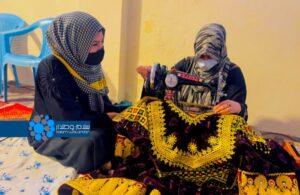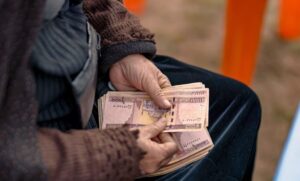KABUL (SW) – Mounting restrictions on Afghan women and girls have led to many of the females lose their social status, value in the family and self-esteem.
This report includes interviews with 25 girls and women who have been deprived of education and work, and all of them narrate how their positions in the family and society have been undermined.
Twenty of these girls and women say that they are facing physical and verbal violence, and psychological pressure from their families. Five others, who have not experienced violence, speak of how their families’ and society’s views on them have changed. They also shared stories of pressure from their families to marry.
Setayesh, a resident of Kabul who had worked in various institutions before the political changes in Afghanistan, said that due to the restrictions imposed by the de-facto government on women’s work, she lost her job, and the behavior of her family members toward her has also changed.
She added that she feels inferior and is even sometimes threatened with forced marriage by her family. “Since I lost my job, my father, mother, and brother no longer value me. When I had a job, my family did not accept that I would marry or separate from them and live alone, but now my father says, ‘If someone having a job to push a cart comes, I will marry you off to him.'”
Similarly, Fawzia, who is the only breadwinner for her family and became unemployed after 17 years of working in various institutions, says that her unemployment has had negative effects on her relationships with her family, and she has sometimes been humiliated by her husband and his family.
“Since I became unemployed, I have been humiliated and insulted by my husband. My family mocked me, saying I don’t work at home, and now that I’m unemployed, they still mock me, saying it’s good that I became unemployed. My mother and sister-in-law have tried to convince my husband to marry another woman because I don’t have a job,” she said.
Zulaikha, a resident of Bamyan, also says she was a teacher before the system changed, and became unemployed afterward. She adds that after losing her job, she is no longer involved in important family decisions, and her opinion is no longer considered. “When I was a teacher, my family often asked for my opinion and respected me; now that I’m no longer a teacher, everyone disrespects me and doesn’t ask my opinion.”
At the same time, some of the girls interviewed for this report, who have been deprived of education due to the recent political changes, say that being away from the educational environment and not having control over shaping their future have caused their families to pay less attention to them compared to before.
Asma, who has been deprived of education due to the closure of schools, says: “The changes have come; personally, when I used to go to school, my parents were very kind to me. They only said, ‘My child, study your lessons.’ But after the schools and universities were closed, their behavior changed drastically. They no longer pay attention to my needs. Now, when I say I want to study English or computer science, they tell me, ‘What did you become after going to school that you want to study English or computers?'”
Additionally, some girls who are supported by their families, but still feel that being away from the educational environment has led them to experience inferiority in society, share their thoughts.
Somaya, a 15-year-old who has been deprived of education, talked about the impact of being away from school on her social status: “It’s natural; at that time we were in an academic environment, and people would say we were educated. But now, since we are sitting at home, of course, there is a difference. Now, when we go to the city or market, people look at us differently. They treat us differently because, as you know, those who are highly educated are given more respect by people.”
Some women’s rights activists also believe that increasing restrictions on the education and work of girls and women, and distancing them from educational and working environments, will have long-term negative consequences for society.
Husna Raufi, a women’s rights activist, says: “In the past three years, the deprivation of women has caused them to face constant and unprecedented challenges. The greatest limitation for women has been the lack of access to education and work, which has led to economic poverty in families and caused families to treat their daughters as household laborers, reducing the priority of educating girls.”
Ahmad Rashid Sediqi, a university professor and social issues expert, also discusses the impact of the deprivation of women on their social status: “Unfortunately, in the society we live in, many times our social status directly affects the income we have in life, and we are respected based on that income, especially women who were once employed but are now unemployed. This leads to a gradual reduction in the attention of family members toward them, and this reduced perspective can affect women’s views on family order and even their children’s education.”
Sewita Habibi, a psychotherapist, also states that the absence of women in social and work environments leads to increased psychological and emotional challenges for girls and women, eventually causing a decrease in their self-confidence. “Unemployment for women can have profound effects on their psyche. First of all, it may cause depression. Additionally, not having a job can lead to feelings of hopelessness and worthlessness.”
The girls and women interviewed for this report, while describing how their positions in the family and society have been weakened due to being deprived of education and work, attributed these restrictions to the de-facto government, especially the Ministry of Promotion of Virtue and Prevention of Vice. Despite this, in response to the weakening of women’s status within families, officials from this ministry claim that they have prevented hundreds of cases of violence against women and will continue to support women’s rights in the future.
Saif al-Islam Khaibar, spokesperson for the Ministry of Promotion of Virtue and Prevention of Vice, told Salam Watandar: “Regarding domestic violence, the Ministry of Promotion of Virtue is very vigilant and has prevented many cases of domestic violence that have occurred for various reasons in families. Those who face such problems within their families can refer to the Ministry of Promotion of Virtue, and if they are in the provinces, they can go to the regional offices and call the number 191.”
Meanwhile, the United Nations has announced that due to the restrictions imposed on women in the past three years, 8 out of every 10 women have faced psychological challenges and domestic violence.






